|
September 2008 Updates
Shanah Tovah - Happy Rosh Hashanah!

Shanah Tovah, chaverim! From my family to you: May this coming year be one in which you draw closer to the Source and Presence of the Living God.... Amen.
We picked apples at an orchard recently for Rosh Hashanah
God is King over all the Earth
09.30.08 The Mishnah (Sanhedrin 38b) states that Adam and Chavah were created on Rosh Hashanah (i.e., Tishri 1). But how did the sages determine this date? By transposing the Hebrew letters of the very first word of the Hebrew Scriptures:
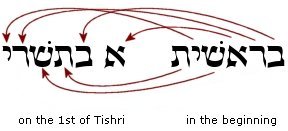
In other words, by rearranging the letters of the word bereshit ("in the beginning"), the phrase aleph b'Tishri ("on the 1st of Tishri") was formed, and therefore this date became associated with the anniversary of creation (or rather, the creation from Adam's perspective, i.e., the sixth day).
Rosh Hashanah therefore represents the day that God began to rule as King of the Universe. When Adam first opened his eyes and human consciousness was born, he immediately understood that the LORD created all things, including himself. According to midrash, Adam's first words were, "The LORD is King for ever and ever." God then said, "Now the whole world will know that I am King," and He was very pleased. The birthday of humanity is therefore the Coronation Day for the King of the Universe. Psalm 47 celebrates the Kingship of God that mentions the "shout" (teruah) and shofar blast of God's coronation:
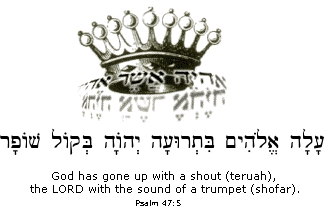 |
The sound of the shofar is meant to awaken our consciousness that the LORD is King of the Universe. As Rambam says, "Wake up from your (moral) sleep. You are asleep. Get up from your slumber. You are in a deep sleep. Search for your behavior. Become the best person you can. Remember God, the One Who created you" (Mishneh Torah). "How blessed are the people who know the joyful sound (teruah), O LORD; they walk in the light of Your Presence" (Psalm 89:15).
Christians and Rosh Hashanah

09.29.08 There are many things Christians can learn from the holiday of Rosh Hashanah (better, Yom Teruah). Here are just a few of them:
First, the LORD God is indeed the King of all the earth, our Creator and Redeemer. He is Melech Gadol al-kol-ha'aretz, (מֶלֶךְ גָּדוֹל עַל־כָּל־הָאָרֶץ), a "great King over all the earth" (Psalm 47:2). Though Christians should acknowledge His righteous rule and Kingship at all times, Rosh Hashanah is a "sanctified reminder" of God's creative authority in our lives. Yeshua (Jesus) is called the Mashiach (מָשִׁיחַ), a term that denotes His Kingly dignity and royalty. He is also the Creator and Sustainer of all creation (Col. 1:16). He is coming to rule and reign from Jerusalem (Zion) in the near future. Christians will be judged according to their deeds of service (2 Cor. 5:10) and the world system (and Satan) will be judged during the Great Tribulation period that precedes the Second Coming. Just as the heavenly shofar was sounded from Sinai, so it will be one day sounded from Zion (Isa. 27:13).
As the only true King and Judge, God indeed has a Sefer HaChayim (Book of Life) as well as a Sefer Ha-Metim (Book of Death). The Scriptures clearly warn that on the Day of Judgment to come, anyone's name not found written in the Book of Life will be thrown into the lake of fire (Rev. 20:15).
Second, the month of Elul and the preparation for Rosh Hashanah reminds us to be ready for the soon appearance of King Yeshua our LORD. Though we do not know the exact day or hour of His return to possess His kingdom on earth, we are commanded to watch and be ready for His soon appearance. We ought, therefore, be in a constant state of repentance (teshuvah) as we seek to humble ourselves and walk with our God.
The New Testament links teshuvah with salvation (יְשׁוּעָה) itself. Yeshua's first message was "Repent and believe the gospel (בְּשׂוֹרָה)" (Mark 1:15), and Paul linked teshuvah with confession and trust in the saving work of the Messiah on our behalf (Rom. 10:8-13). Teshuvah implies a response to the Person of Yeshua that is demonstrated through confession that He is none other than YHVH, the LORD of Compassion and grace. The sound of the shofar is meant to awaken our hearts and to prepare for coming judgment.
Third, Rosh Hashanah itself, or rather Yom Teru'ah, has prophetic significance in the life of the Christian. The blowing of the shofar is prophetic of the rapture of the church, where those who are part of the Bride of Mashiach, the church, will experience everlasting transformation:
"Behold, I show you a mystery; We shall not all sleep, but we shall all be changed, in a moment, in the twinkling of an eye, at the last trumpet (shofar): for the trumpet (shofar) shall sound, and the dead shall be raised incorruptible, and we shall be changed." (1 Corinthians 15:51)
The Talmud states that on Rosh Hashanah the dead will be raised (Rosh Hashanah 16b). This corresponds to the "last trump" mentioned by the Apostle Paul (1 Cor. 15:52).
Fourth, the Tashlikh ceremony reminds us that our LORD is a God of new beginnings, and even if we have sinned and fallen away from Him, He is faithful to restore us and cast our sins away from us. After all, God sent His only Son Yeshua to be our Sin-Bearer and Kapparah, so we can take comfort in His forgiveness when we earnestly seek to repent from the harm we have done and begin anew with God.
Fifth, we should be grateful to the LORD for writing our names in the Lamb's Book of Life, or Sefer HaChayim. Of course we do not believe that we are made acceptable in the LORD's eyes by means of our own works of righteousness (Titus 3:5-6), but that does not excuse us from being without such works (as fruit of the Spirit in our daily life).
Sixth, the Akedat Yitzchak ("Binding of Isaac") is a major theme on Rosh Hashanah. According to Jewish tradition, God told Abraham that the ram's horn (shofar) should be blown on Rosh Hashanah to remind the people of the substitutionary sacrifice provided by the LORD Himself -- an echo of the First Sacrifice offered in Eden. How much more should we as believers in the greater sacrifice of Yeshua as our Lamb of God celebrate this day?
Finally, we anticipate the prophetic fulfillment of the LORD's covenant faithfulness to Israel when we understand that the Yamim Nora'im foreshadow the future repentance of national Israel in the days to come. This pictures the Great Tribulation and Yom Adonai - the Day of the LORD - that arrives just before national Israel's ultimate shuvah (return). Yom Kippur is the Holiday that pictures the full restoration of Israel to all her covenant promises with Yeshua as the recognized Kohen Gadol (High Priest) of the New Covenant. The Brit Chadashah will be embraced and Yeshua will be revealed as Israel's Savior, LORD, and Deliverer. Then "all Israel shall be saved" (Rom. 11:26).
For more information, please see the Rosh Hashanah pages or scroll through the entries below.... Shanah Tovah!
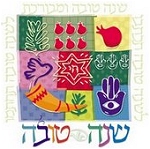
 |
Rosh Hashanah and the Future
09.28.08 In the Torah, the first day of the seventh month is to be commemorated as Yom Teruah (יוֹם תְּרוּעָה), sometimes translated as the "Feast of Trumpets" (Num. 29:1, Lev. 23:24). The word teruah means "shouting" or "raising a noise," and therefore this day was to be marked by making a joyful noise unto the LORD (Psalm 81:1-4). Of all the moedim (holidays), Yom Teruah is unique because 1) it's the only holiday that begins on a New Moon and 2) there is no explicit reason given in the Torah for its observance other than to "rest" and to offer sacrifice (Num. 29:1, Lev. 23:24). After the Second Temple was destroyed in 70 AD, however, the sages of the Mishnah redefined Judaism and associated Yom Teruah with the start of the Jewish civil year. Yom Teruah then became known as "Rosh Hashanah" (the head of the year).
Trumpets and Shofars
Silver trumpets (חֲצוֹצְרת, cha-tzotz-rot) were originally used to signal camp movements during the journey to the Promised Land (Num. 10:1-2). Later they were used by the Levites during various Temple rituals, especially during the offering of animal sacrifices (Num. 10:10). They were also sometimes used in times of warfare (Num. 10:9; 31:6; 2 Chr. 13:12-14).

These silver trumpets are to be distinguished from the ram's horn trumpet (שׁוֹפָר, shofar) that was explicitly commanded to be sounded during Yom Kippur (Lev. 25:9) and during the Yovel (Jubilee Year). The common consensus among the sages was that the shofar, not the silver trumpet, was likewise used for Yom Teruah (Mishnah: Rosh Hashana 16a, 3:3). The shofar was a reminder of the exchange of the divinely provided ram as ransom for Isaac's life (the Akedah) and of the giving of the Torah to Israel at Sinai (Exod. 19:16).

Coming Judgment...
 |
According to later rabbinical tradition, on Rosh Hashanah the destiny of the righteous, the tzaddikim, are written in the Book of Life, and the destiny of the wicked, the resha'im, are written in the Book of Death. Most people, however, won't be inscribed in either book, but are given ten days -- until Yom Kippur -- to repent before sealing their fate. On Yom Kippur, then, everyone's name will be sealed in one of the two books. The ten days between Rosh Hashanah and Yom Kippur are therefore called Aseret Yemei Teshuvah - the "Ten Days of Repentance" - because personal repentance can affect the divine decree for good....
As Messianic believers, we maintain that Judgment Day has come and justice was served through the sacrificial offering of Yeshua for our sins (2 Cor. 5:21). He is the perfect fulfillment of the Akedah of Isaac. Our names are written in the Lamb's Book of Life, or Sefer HaChayim (Rev. 13:8). We do not believe that we are made acceptable in God's sight by means of our own works of righteousness (Titus 3:5-6), but that does not excuse us from being without such works (as fruit of the Holy Spirit in our lives). The Scriptures clearly warn that on the Day of Judgment to come, anyone's name not found written in the Book of Life will be thrown into the lake of fire (Rev. 20:15).
Yom Adonai - the Day of the LORD
The Spring Festivals (Passover, Firstfruits, and Shavuot) have been perfectly fulfilled in the first coming of Yeshua as Mashiach ben Yosef, and the Fall Festivals (Teruah, Yom Kippur, and Sukkot) will be fulfilled in His second coming as Mashiach ben David. Since the first advent fulfilled all of the spring mo'edim to the smallest of details, we believe that His second advent portends similar fulfillment as revealed in the fall mo'edim.
After the summer of harvest (John 4:35), the very first Fall festival on the Jewish calendar is Yom Teruah, which is a picture of the "catching away" of kallat Mashiach (the Bride of Christ) for the time of Sheva Berachot (seven "days" of blessing that follows the marriage ceremony). Then will come the Great Tribulation and Yom Adonai - the Day of the LORD (יוֹם יְהוָה). The heavenly shofar blasts heard at Sinai will be reissued from Zion. First will be the gathering together of those who follow the Mashiach (i.e., those declared tzaddikim because of the merit of Yeshua's sacrifice), and then God's war against Satan and the world system will begin, culminating in the long-awaited coronation of the King of King of Kings - Melech Malchei Ha-Melachim (מֶלֶךְ מַלְכֵי הַמְּלָכִים).
Rosh Hashanah (or better, Yom Teruah) is therefore a sacred time that has prophetic significance for the Messianic believer, since it commemorates both the creation of the universe by Adonai as well as the "calling up" of the new creation at the behest of Yeshua, when the sound of the heavenly shofar inaugurates the anticipated End of Days (1 Cor 15:51-54; 1 Thessalonians 4:15-18). It also prefigures the coming Day of the LORD and Great Tribulation period that marks God's judgment on an unbelieving world...
With the appearance of the Great King comes great judgment. Let's be ready to appear before this awesome King, chaverim, by turning to Him now and trusting in His redemption and love for us... Shanah Tovah.
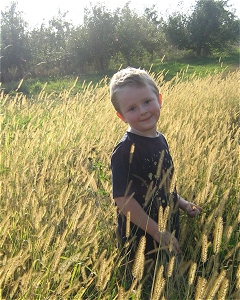
Josiah sends you a shanah tovah!
Days of Awe - יָמִים נוֹרָאִים
09.26.08 Unlike the three Pilgrimage Festivals that commemorate momentous events in the history of the Jewish people (i.e., Passover, Shavuot, and Sukkot), the "Days of Awe" (i.e., the ten days from Rosh Hashanah through Yom Kippur) focus more on the prophetic history of each soul as it stands before God. In that sense the Days of Awe are regarded as somewhat "timeless" by the sages, since they call for an eternal power to help us be restored before the LORD. This eternal power is called teshuvah (turning to God).
Teshuvah is said to predate the Creation of the universe itself, based on Psalm 90:3: "Before the mountains were born... You said, 'Return (שׁוב), O sons of man.' Since teshuvah stands beyond the realm of history or the national call of Israel, it transcends "laws of nature" and suggests that time is reversible, that nothing is irredeemable, and that even moments of personal shame can be restored and healed by the love of God. As Messianic Jews we see that Yeshua is the Lamb slain before the foundation of the world - the meaning and goal of all teshuvah....
The sages say that the days of the month of Elul are Yemei Ratzon - "Days of Favor." God created us to fulfill His purpose (ratzon), and this is most fully discovered in the favor of His grace. Hence a phrase from this week's parashah (Deut. 30:6) reads, "God will remove the barriers," or in Hebrew, אֶת־לְבָבְךָ וְאֶת־לְבַב, which is said to be an acronym for the word Elul (אלול). Yeshua has circumcised the hearts of those who trust in Him. His favor rests upon those who genuinely turn to God. Trusting in His sacrifice on the cross satisfies God's righteous judgment and sets our hearts free to fulfill His deeper purposes....
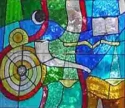
Anniversary of Creation
09.25.08 Today is Elul 25, traditionally recognized as the anniversary of creation, when the LORD first created the Divine light. This is the first work of creation (מַעֲשֵׂה-בְּרִאשִׁית) performed by God when He began creating the heavens and the earth.
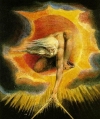
Adam and Chavah were created on the sixth day of God's creative activity, which is remembered as Rosh Hashanah (on Tishri 1). For more, see the entries on Rosh Hashanah, below.
New Hebrew Mediation
09.24.08 I wrote a new Hebrew mediation (Lechem Ha-Chaim) based on Deuteronomy 8:3, "Man shall not live by bread alone..." I hope you will find it encouraging, chaverim.

B'ezrat HaShem, tomorrow I will add some additional thoughts about Rosh Hashanah and the soon-coming High Holidays. Meanwhile, I wish you shalom and love in our beloved Mashiach Yeshua.
Turning, Turning, Turning...
09.23.08 How do we prepare for Rosh Hashanah? Traditionally we prepare through three types of turning: 1) turning to God (tefillah); 2) turning to others we've harmed or offended (teshuvah), and 3) turning to those in need (tzedakah). In all three cases we can genuinely return to God only by choosing to embrace the truth about our lives.
Our prayers (tefillot) are offered in the plural, emphasizing that we are all interconnected. This is the idea of kol Yisrael arevim zeh bazeh: "All Israel is responsible for one another" (Talmud Shavuot 39a). We are all one "body" and should one member hurt, we all are diminished (1 Cor. 12:26). Avinu Malkenu - "Our Father, our King..." Our teshuvah means that we honestly examine ourselves and repair any breach we might have created in our relationships (James 5:16). And our tzedakah means that we turn away from ourselves entirely, considering the the needs of others and their welfare instead of our own. May it please the LORD to help us all turn to Him for life!

Having a Brit of Heart...
09.22.08 This week's Torah portion (Nitzavim) includes the pasuk (verse): "The LORD your God will circumcise your heart...so that you will love the LORD your God with all your heart and with all your soul, that you may live" (Deut. 30:60). This speaks about the miracle of teshuvah - returning to the LORD - by having the barriers around our heart removed by Him. Circumcision of the heart "opens up" the inner life, exposing tenderness and compassion toward God and others. God is tenderhearted to those who are in need, and a heart bound by His covenant will likewise be a heart of compassion....
An uncircumcised heart is naturally "hard hearted" and closed off toward others who need us. Selfishness, greed, "the flesh," etc., are contained within the heart's foreskin. This is the "natural" state of our souls. The inward circumcision of the heart, however, touches the soul (neshamah) and "marks" the inner life with the covenant of God's grace. This is called the "circumcision made without hands" (Col. 2:11), a spiritual operation that occurs through our identification with Yeshua the Messiah.... This miracle of a changed heart is God's gift to us. It is given to those who return to Him in humility and confession of their need for salvation from themselves (Lev. 26:40-42).
Parashat Nitzavim - נצבים
09.21.08 The Torah reading for this coming Shabbat is Nitzavim ("You are standing"), the 51st portion (of 54) for the Hebrew year 5768. Parashat Nitzavim always falls on the Shabbat immediately before Rosh Hashanah. In many synagogues, the opening and concluding paragraphs of Nitzavim are also read during the Yom Kippur morning service.

This great portion begins: "You are standing here today, all of you, before the LORD your God (אַתֶּם נִצָּבִים הַיּוֹם כֻּלְּכֶם לִפְנֵי יְהוָה אֱלהֵיכֶם)... so that you may enter into the sworn covenant of the LORD your God, which the LORD your God is making with you today, that he may establish you today as his people, and that he may be your God, as he promised you, and as he swore to your fathers, to Abraham, to Isaac, and to Jacob" (Deut. 29:10-13). This marks a solemn moment for us, chaverim....
After Moses reviews Israel's history and prophetic future -- i.e., the great prophecy of the Diaspora and Return of the Jewish people -- he solemnly makes appeal to turn to the LORD for life. This way of return (teshuvah) is always a matter of the heart and will. "For this commandment (of teshuvah) is not hidden from you, and it is not far away. It is not in heaven...nor across the sea.... Rather, the matter is very near you - in your mouth and your heart - to do it" (Deut. 30:11-14; cp. Rom. 10:8-13). In the end of days (acharit hayamin), the LORD will remove the "partial hardening" of the Jewish people so that they will turn to Him with all their heart and soul (Deut. 30:6, Rom. 11:25-26).
But why this seemingly topsy-turvy process of national teshuvah? This is part of the secret decree of God, as it is written in this very parashah: "The secret things (ha-nistarot) belong to the LORD our God (הַנִּסְתָּרת לַיהוָה אֱלהֵינוּ), but the things that are revealed (ha-niglot) belong to us and to our children forever, that we may do all the words of this law" (Deut. 29:29). God's plan for Israel in the nations demonstrates His wisdom, power, and glory, as Paul wrote: ω βαθος πλουτου και σοφιας και γνωσεως θεου ως ανεξερευνητα τα κριματα αυτου και ανεξιχνιαστοι αι οδοι αυτου - "Oh, the depth of the riches and wisdom and knowledge of God! How unsearchable are his judgments and how inscrutable his ways!" (Rom. 11:33).
Perhaps you (like me) once learned Psalm 19:7 as, "The Law of the LORD is perfect, converting the soul." The Hebrew text reads, תּוֹרַת יְהוָה תְּמִימָה מְשִׁיבַת נָפֶשׁ, and might better be translated as, "The instruction of the LORD is perfect, returning the soul." Giving heed to the Torah causes our souls to undergo teshuvah, the very theme of Rosh Hashanah and the High Holidays....
Now more than ever, chaverim. We must not put our trust in man or in this moribund world system (κοσμος). We are living in the "end of days." God's judgment has begun in earnest. It is time for us to choose whether we will be shaken or if we will walk in the trust of the LORD God of Israel....
New Beginnings
Thursday, September 25, is Elul 25 - the anniversary of the Creation of the Universe by God. Rosh Hashanah (Yom Teruah) is six days later, on Tishri 1, which begins with the new moon on Monday, September 29th this year. Rosh Hashanah is traditionally understood to be the anniversary of the creation of humanity by the LORD. Shanah Tovah, Chaverim...

Note: I am currently working on a new book on the Names and Titles of God. Your prayers for this work are sincerely appreciated....
Hakarat Tovah - הַכָּרַת-טוֹבָה
09.17.08 The Hebrew word hakarah (הַכָּרָה) means to recognize or to be conscious. Hakarat tovah means recognizing or being conscious of the good, i.e., gratitude. Hakarat tovah is one of the middot ha-lev (qualities of heart) that should mark the lives of those who are grace-based and focused. Gratitude is the product of joy (χαρα) obtained from the gift of being conscious of God's grace (χαρις).
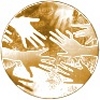
When the firstfruits (bikkurim) were offered at the Temple, a declaration of hakarat tovah was made (Deut. 26:3) that expressed thanks for the good the LORD has done for the Jewish people since the days of Ya'akov (Jacob) to the present hour... The declaration was intended to give voice to the heart and to sanctify the act of giving. It's not enough to "go through the motions" of a ritual: We must become conscious of the good we have received by engaging the heart's response.
Some of the sages have said that hakarat tovah is the foundation of avodat Adonai - our very service to God. Gratitude is basic response to being conscious of reality -- the reality of God's unending care and sustenance..... Being kefuy tovah (ungrateful) is a sign that you are not seeing reality correctly. It is a spiritual impairment, a sickness of heart, that can lead you into darkness...
With that said, please know that I sincerely appreciate that many of you have shown us chesed and grace over the last two months. I am deeply touched by your love. We cannot be here without one another, and you are sustaining us. Thank you.
 |
Talmud Torah Keneged Kulam...
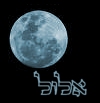
09.16.08 The Mishnah (Zeraim, Peah 1:1) speaks about things that "have no measure" (i.e., things that are valuable both in this world and in the world to come). Among such things are acts of kindness (גְמִילוּת חֲסָדִים), honoring one's parents, pursuing justice and peace, and so on. The greatest of these, however is the study of Torah, or, as the Mishnah puts it: Talmud Torah keneged kulam (תַלְמוּד תּוֹרָה כְּנֶגֶד כֻּלָּם), "the study of Torah is equal to them all." According to the sages, each word of Torah you study is equal to all of the 613 commandments combined. The Orchot Tzaddikim (a popular code of ethics) adds that the reward done for mitzvah b'simchah - a commandment done with joy - is a thousand times greater than one performed unhappily. There is duty and there is joy, chaverim....
The parashah for this coming Shabbat (Ki Tavo) includes these words: "Because you did not serve the LORD your God with joyfulness and gladness of heart, because of the abundance of all things, therefore [all these curses will come upon you]..." (Deut. 28:47-48). Joy is a prerequisite for serving the LORD, and true happiness is found in the grace He supplies us to do His will. Indeed, the Greek word for joy used in the New Testament (χαρα) is related to the word for grace (χαρις), so there is a profound connection between apprehending grace and experiencing joy (Phil. 4:4).
Sometimes, of course, it is difficult to express joy, especially when we feel oppressed or saddened. The Scriptures never disavow our emotional states (read Psalm 13 or Psalm 88, for example), but an underlying note of grace is always sounded, even in painful moments and times. This is our consolation in suffering.... sorrowful yet ever rejoicing.

And this works the other way, too. Even in our most joyous occasions, such as the great simchah of a wedding, the "glass is shattered" to remind ourselves that our eternal joy is not yet fulfilled... We live in an "already-not-yet" state of existence. Our best moments are beset with shadows; our darkest are limned with hope of the new eternal day to come. As Paul said, "I consider that the sufferings of this present time are not worth comparing with the glory that is to be revealed to us" (Rom. 8:18).
May that day dawn for us soon, chaverim...

Repent one day before you die...
09.14.08 In this week's Torah reading (Ki Tavo), the LORD commanded that the firstfruits (bikkurim) of crops be brought to the priests in the central sanctuary in a prescribed ritual. This celebration later was associated with the festival of Shavuot ("Pentecost").
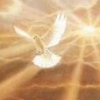
Each family would go up to Jerusalem to present a basket of their finest fruits to a kohen (priest), who then would wave it in seven directions (tenufah) and set it before the altar. The worshipper would then recite a ceremonial vidui (confession) before the priest that began, "A wandering Aramean was my father." Some of the sages understand this opening phrase to mean: "An Aramean destroyed my father," based on the the verb oved (אבד) that alludes to devastation (the word Abaddon comes from the same root). So understood, this confession thanks God not only for Israel's deliverance from bondage in Egypt, but also from the evil designs of Laban who sought to kill Jacob when he left for the Promised Land. The sages reasoned that "Uncle Laban" was at heart an enemy of God who literally sought to kidnap the sons of Israel (Gen. 31:43).
Though this portion begins with a joyful subject that celebrates God's faithfulness, it also includes a litany of curses (kelalot) proclaimed for those who stray away from the truth of Torah. The frightening list of curses is summed up in Deut. 28:45-48:
All these curses shall come upon you and pursue you and overtake you till you are destroyed, because you did not obey the voice of the LORD your God, to keep his commandments and his statutes that he commanded you. They shall be a sign and a wonder against you and your offspring forever. Because you did not serve the LORD your God with joyfulness and gladness of heart, because of the abundance of all things, therefore you shall serve your enemies whom the LORD will send against you, in hunger and thirst, in nakedness, and lacking everything. And he will put a yoke of iron on your neck until he has destroyed you.
Notice something profoundly important here: All the varied and distressing curses enumerated in this Torah portion would come upon those who refused to serve the LORD "with joy (simchah, שִׂמְחָה) and gladness of heart." In other words, living a discontented and ungrateful life leads to greater and greater rebellion. Genuine joy is heartfelt appreciation at the wonder and grace of God. Indeed, the Greek word for joy (χαρα) is related to the word for grace (χαρις), so there is a deep inner connection between grace and joy (Phil. 4:4). The joy of the LORD is our strength (Neh. 8:10).
The sages connect the joy of offering first fruits with the study of Torah, since the phrase "You shall take from the first" (Deut. 26:2) alludes to the Torah, the first part of our wisdom (Psalm 111:10). In the world to come, the first thing you will be asked is if you had learned the wisdom and truth of Torah.... "Blessed ("happy") is the man who...delights in the Torah of the LORD and meditates upon it day and night" (Psalm 1:1-2). If you find studying and living the truth of Scripture joyless, then be careful that you don't drift into spiritual exile.
Why is this portion of Torah always read during the Season of Teshuvah? Because the blessings and curses are intended to awaken us to perform "soul searching (cheshbon ha-nefesh, חֶשְׁבּוֹן הַנֶּפֶשׁ) and teshuvah. The Talmud says, "Repent one day before you die." But who knows the day of one's death in advance? Therefore live each day as if it were to be your last, and live it with joy.
Shuva! Return to the LORD and serve Him with gladness (Psalm 100:2). Come in joy of what Yeshua, our Firstfruit of the LORD (1 Cor. 15:20), has done for you: "Though you have not seen him, you love him. Though you do not now see him, you believe in him and rejoice with joy that is inexpressible and filled with glory, obtaining the outcome of your faith, the salvation of your souls" (1 Pet. 1:8-9).

Sacrifice and Creation...
09.13.08 Traditional Judaism regards Rosh Hashanah as the date of the Creation of the universe by God (Talmud: Rosh Hashanah 27a), but the Midrash says it occured six days earlier, on the 25th of Elul, when God created the Divine light by saying, "Let there be light" (Gen. 1:3-5). Since Adam and Eve were created on the Sixth Day of Creation (i.e., the Eve of the First Shabbat), Rosh Hashanah marks the anniversary of God's creation of humanity, not of the universe itself (Vayikra Rabbah 29:1).

The Midrash also says that on this very first Rosh Hashanah (i.e, the day of humanity's creation) Adam and Eve committed the fatal sin by eating from the forbidden Tree of the Knowledge of Good and Evil:
They taught in the name of R' Eliezer: On the twenty-fifth day of Elul the world was created... On the day of Rosh Hashanah, during the first hour, it occurred to His thought [i.e., to create man]; in the second, He took council with the ministering angels; in the third, He gathered together his dust; in the fourth, He kneaded him; in the fifth, He shaped him; in the sixth, He completed his form; in the seventh, He breathed into him soul; in the eighth, He placed him in the Garden; in the ninth, he was commanded; in the tenth, he transgressed; in the eleventh, he was judged; and in the twelfth, he went free.
After the LORD judged Adam and Eve, He compassionately gave them the skin of a sacrificial lamb as their covering (Gen. 3:21). This First Sacrifice, offered by the Hand of God Himself, foreshadowed the coming Sacrifice of the Lamb of God who was slain "from the foundation of the world" (1 Pet. 1:20). On the very first day of mankind's creation, then, the LORD initiated His plan of redemption and salvation through Yeshua (Jesus) as the Divine Light of the world (אוֹר הָעוֹלָם).
Midrash Bereshit includes the statement: "Great is teshuvah, for it preceded the Creation of the World, as it says, 'Before the mountains came into being, You reduced Man to nothingness, and said 'Return' (Psalm 90:2-3)." This idea suggests that God created humanity with the intent of ultimately revealing Himself as Redeemer and Savior. Therefore we see the Lamb of God (שֵׂה הָאֱלהִים) slain "from the foundation of the world" (1 Pet. 1:20) restoring the kingdom that was prepared for those chosen to be redeemed "before the foundation of the world" (Eph. 1:4, Matt. 25:34). The Book of Revelation likewise mentions the Book of Life of the Lamb that was slain (סֵפֶר חַיֵּי הַשֶּׂה הַטָּבוּחַ) "from the foundation of the world" (Rev. 13:8, 17:8).
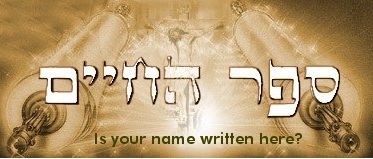 |
The Akedat Yitzchak ("Binding of Isaac") is a major theme on Rosh Hashanah. According to Jewish tradition, God told Abraham that the ram's horn (shofar) should be blown on Rosh Hashanah to remind the people of the substitutionary sacrifice provided by the LORD Himself -- an echo of the First Sacrifice offered in Eden. How much more should we as believers in the greater sacrifice of Yeshua as our Lamb of God celebrate this day?
Parashat Ki Tavo - כי־תבוא
09.13.08 The Torah reading for this coming Shabbat is Ki Tavo ("When you go in"), the 50th portion (of 54) for the Hebrew year 5768.
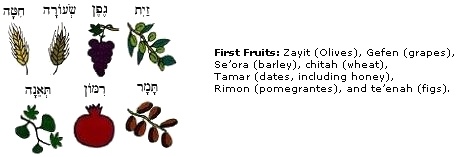
Note that Rosh Hashanah is in just two weeks! Please see the article on Elul for information about attuning yourself to the Jewish mo'edim.
Selichah (forgiveness) - סְלִיחָה
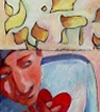
09.11.08 Observant Jews are in the midst of the Hebrew month of Elul, the season of repentance (teshuvah - תְּשׁוּבָה). This is a time of soul searching (cheshbon hanefesh - חֶשְׁבּוֹן הַנֶּפֶשׁ) and prayers for forgiveness (selichot - סְלִיחוֹת) in anticipation of the Ten High Holy Days (Tishri 1-10). All of this culminates in Yom Kippur, the Day of Atonement, with the hope of obtaining a favorable decree from Heaven that we should live another year....
The Hebrew word selichah (סְלִיחָה) means "excuse me!" in colloquial Hebrew, but in the Scriptures it refers exclusively to God's offer of pardon and forgiveness of the repentant sinner. In Psalm 130:4 we read, "But with you there is forgiveness (selichah), that you may be feared" (כִּי־עִמְּךָ הַסְּלִיחָה לְמַעַן תִּוָּרֵא).
The appeal to God's forgiveness is connected to the great revelation of the Name of the LORD (יהוה) given to Moses in Exodus 34:6-7. After the Jews had committed the grievous sin with the Golden Calf, Moses despaired of ever being able to find favor in God's eyes again. God, however (as recounted in the Talmud (Rosh Hashanah 17b)), donned a prayer shawl, and, in the role of a cantor, sang to Moses the order of the thirteen attributes of rachamim (mercy). These thirty-two words (Exod. 34:6-7) have become known in Jewish tradition as the Shelosh Esrei Middot shel Rachamim, or the Thirteen Attributes of God's Mercy:
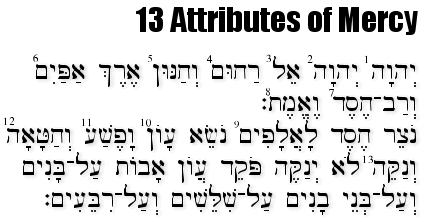 |
According to traditional interpretations, the thirteen attributes are articulated as follows:
- Adonai (יהוה) - I, the LORD, am the Compassionate Source of all of life; I am the breath of life for all of creation.
- Adonai (יהוה) - I, the LORD, am also compassionate to one who has sinned and repented.
- El (אֵל) - I, the LORD, am God the Almighty and Omnipotent;
- Rachum (רַחוּם) - I, the LORD, am merciful (rachamim (רַחֲמִים) means "mercy" and rechem (רֶחֶם) means "womb");
- Chanun (חַנּוּן) - I, the LORD, am gracious; I pour out my favor freely to all of creation. (Chen (חֵן) is the word for "grace");
- Erekh Apayim (אֶרֶךְ אַפַּיִם) - I, the LORD, am slow to anger and patient (the word erekh means "long" and af (אַף) means "nose." The idiom erekh apayim means "long suffering, patient");
- Rav Chesed (רַב־חֶסֶד) - I, the LORD, am abundant in love (חֶסֶד) to both the righteous and the wicked;
- Rav Emet (רַב־אֱמֶת) - I, the LORD, am truthful and faithful in carrying out promises;
- Notzer Chesed La'alafim (נצֵר חֶסֶד לָאֲלָפִים) - I, the LORD, retain chesed (love) for thousands of generations, taking into account the merit of our worthy ancestors (called zechut avot);
- Nosei Avon (נשֵׂא עָוֹן) - I, the LORD, forgive iniquity (avon), defined in the tradition as wrongful deeds committed with premeditation; I "carry iniquity away" (nasa) for the penitent;
- Nosei Pesha (נשֵׂא פֶשַׁע) - I, the LORD, forgive transgression (pesha), defined as wrongful deeds committed in a rebellious spirit;
- Nosei Chata'ah (נשֵׂא חַטָּאָה) - I, the LORD, forgive sin (chet), defined as those wrongful deeds that were inadvertently committed;
- Nakkeh (נַקֶּה) - I, the LORD, will not cancel punishment, but I will clear the guilt for those who genuinely return to Me in teshuvah.
During Israel's national confession of sin (after the Babylonian Exile) appeal was made according to the revealed Name: "But you are a God ready to forgive, gracious and merciful, slow to anger and abounding in steadfast love" (Neh. 9:17). Even though Israel's sins called for God's righteous judgment as the perfect Lawgiver (אֱלהִים), appeal was made to His revelation as YHVH, the Compassionate One. The appeal to God's mercy reassures us that teshuvah (repentance) is always possible and that God always awaits our return to Him.
In Jewish tradition, Selichot (סְלִיחוֹת) is a "technical term" that refers to additional prayers for forgiveness recited during the month of Elul (through Yom Kippur). These prayers and poems are usually recited before dawn, before the daily shacharit (morning) service. The list of the Thirteen Attributes of God's Mercy are the primary focus of the prayers, based on the Talmud's statement that, "Whenever the nation of Israel sins, let them pray this prayer (i.e., the Thirteen Attributes) and I shall forgive them" (Rosh Hashanah 17b).
In rabbinical Judaism, however, Selichot are said as a means of rendering a favorable verdict of "din," or "judgment" by God during the Days of Awe. As Messianic believers, however, we affirm that eternal forgiveness is obtained by exercising emunah (faith) in the sacrifice of Yeshua as the kapparah for our sins, and by evidencing wholehearted teshuvah in our daily life. This is the New Covenant truth expressed by the author of the book of Hebrews:
But when Mashiach (הַמָּשִׁיחַ) appeared as High Priest (הַכּהֵן הַגָּדל) of the good things that have come, then through the greater and more perfect tabernacle (מִשְׁכָּן), not made with hands, that is, not of this creation, he entered once for all into the holy places (הַקּדֶשׁ), not by means of the blood of goats and calves but by means of his own blood, thus securing an eternal redemption (פְּדוּת עוֹלָם).
For if the sprinkling of defiled persons (טָמֵא) with the blood of goats and bulls and with the ashes of a heifer sanctifies for the purification of the flesh, how much more will the blood of Mashiach (דַם הַמָּשִׁיח), who through the Eternal Ruach (רוּחַ עוֹלָם) offered himself without blemish to God, purify our conscience from dead works to serve the living God (אֱלהִים חַיִּים).
Therefore he is the mediator (מַלְאָךְ מֵלִיץ) of a new covenant (בְּרִית הַחֲדָשָׁה), so that those who are called may receive the promised eternal inheritance (נַחֲלַת עוֹלָם), since a death has occurred that redeems them from the transgressions committed under the first covenant (הַבְּרִית הָרִאשֹׁנָה).
For where a will (διαθηκη) is involved, the death of the one who made it must be established. For a will takes effect only at death, since it is not in force as long as the one who made it is alive. Therefore not even the first covenant was inaugurated without blood. For when every commandment of the law had been declared by Moses to all the people, he took the blood of calves and goats, with water and scarlet wool and hyssop, and sprinkled both the book itself and all the people, saying, "This is the blood of the covenant that God commanded for you." And in the same way he sprinkled with the blood both the mishkan and all the vessels used in worship (Ex. 24:6-8). Indeed, under the law almost everything is purified with blood, and without the shedding of blood there is no forgiveness of sins (Lev. 17:11). Thus it was necessary for the copies of the heavenly things to be purified with these rites, but the heavenly things themselves with better sacrifices than these. For Mashiach has entered, not into holy places made with hands, which are copies (αντιτυπος) of the true things, but into heaven itself, now to appear in the presence of God on our behalf.
Nor was it to offer himself repeatedly, as the High Priest (הַכּהֵן הַגָּדל) enters the holy places every year with blood not his own, for then he would have had to suffer repeatedly since the foundation of the world. But as it is, he has appeared once for all at the end of the ages to put away sin by the sacrifice of himself. And just as it is appointed for man to die once, and after that comes judgment, so Mashiach, having been offered once to bear the sins of many, will appear a second time, not to deal with sin but to save those who are eagerly waiting for him.
For since the law (תּוֹרה) has but a shadow (σκια) of the good things to come instead of the true form of these realities, it can never, by the same sacrifices that are continually offered every year, make perfect (τελειωσαι) those who draw near. Otherwise, would they not have ceased to be offered, since the worshipers, having once been cleansed, would no longer have any consciousness of sin? But in these sacrifices there is a reminder of sin every year. For it is impossible for the blood of bulls and goats to take away sins (Psalm 50:13; 51:16-17). Consequently, when Mashiach came into the world, he said, "Sacrifices and offerings you have not desired, but a body have you prepared for me; in burnt offerings and sin offerings you have taken no pleasure (Psalm 40:6). Then I said, 'Behold, I have come to do your will, O God, as it is written of me in the scroll of the book'" (Psalm 40:7).
When he said above, "You have neither desired nor taken pleasure in sacrifices and offerings and burnt offerings and sin offerings" (these are offered according to the law), then he added, "Behold, I have come to do your will" (אָז אָמַרְתִּי הִנֵּה־בָאתִי בִּמְגִלַּת־סֵפֶר כָּתוּב עָלָי).
He abolishes the first in order to establish the second (αναιρει το πρωτον ινα το δευτερον στηση).
And by that will (θελημα) we have been sanctified (קִדֵשׁ) through the offering (קָרְבַּן) of the body of Yeshua the Mashiach once for all.... For by a single offering he has perfected for all time those who are being sanctified.
And the Holy Spirit (רוּחַ הַקּדֶשׁ) also bears witness to us; for after saying, "This is the covenant (הַבְּרִית) that I will make with them after those days, declares the Lord: I will put my laws on their hearts, and write them on their minds," then he adds, "I will remember their sins and their lawless deeds no more" (Jer. 31:31-ff).
Where there is forgiveness of these, there is no longer any offering for sin (קָרְבָּן עָל־הַחֵטְא). Therefore, brothers, since we have confidence to enter the holy places (הַקּדֶשׁ) by the blood of Yeshua (בְּדַם יֵשׁוּעַ), by the new and living way that he opened for us through the curtain (הַפָּרֹכֶת), that is, through his flesh, and since we have a great priest over the house of God (כּהֵן גָּדוֹל עַל־בֵּית הָאֱלהִים), let us draw near with a true heart in full assurance of faith (אֱמוּנָה), with our hearts sprinkled clean from an evil conscience and our bodies washed with pure water. Let us hold fast the confession of our hope without wavering, for he who promised is faithful (נֶאֱמָן).
Hebrews 9:11-10:23
 |
New Hebrew Practice Grid - for Kids
09.10.08 Today I created a larger alphabet practice grid for those of you who are teaching younger children the Hebrew Aleph-Bet (it's also helpful for new adult learners, too). You can download it here.
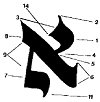
I hope you might find it helpful...
L'David HaShem Ori - לְדָוִד יְהוָה אוֹרִי
09.09.08 Though Rosh Hashanah focuses on God (אֱלהִים) as our Creator and Judge, during the preceding month of Elul, Psalm 27 is recited twice a day as an appeal to God as Havayah (יהוה), the LORD of Compassion. Hence King David, Israel's great King, said, "One thing have I asked of the LORD (יהוה), that will I seek after: that I may dwell in the house of the LORD all the days of my life, to gaze upon the beauty of the LORD and to inquire in his sanctuary" (Psalm 27:4).
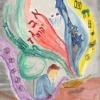
The one thing David sought is the one thing the LORD wishes most to give to us.... The best thing in life is to cleave to the LORD and be attached to Him (devakut). That is what it means to be "in the house of the LORD all the days of your life." As David said elsewhere: "I have set the LORD always before me; because He is at my right hand, I shall not be moved" (Psalm 16:8).
David lived in twofold hope. The end of Psalm 27 reads, "Hope to the LORD (קַוֵּה אֶל־יְהוָה) and He will give you strength; and (again) hope to the LORD" (Psalm 27:14). There can be no genuine teshuvah (returning to God) without genuine tikvah (hope). As the Apostle Paul wrote: "We are saved by hope" (Romans 8:24).
The Month of Elul - אלול
09.08.08 "The last shall be first; the first shall be last." The last month of the Jewish calendar (Elul) is actually one of the most important of the Jewish year, a time of preparation for the coming Jewish New Year (Rosh Hashanah) and High Holy Days (Tishri 1-10). Elul started this year on September 1st.... For more, see this page.

Note: In traditional Judaism, the name Elul (אלול) is said to be an acronym for ani l'dodi v'dodi li (אֲנִי לְדוֹדִי וְדוֹדִי לִי), "I am my beloved's and my beloved is mine" (Song 6:3). We are beloved to God. He calls us to draw closer to Him. According to Midrash, during this month God's Presence hovers closer to us, making it easier to reach out to Him in advance of Rosh Hashanah, the Day of Judgment. For traditional Jews, then, Elul is a season of appeal for God's mercy (רַחֲמִים) in anticipation of coming judgment. In Aramaic, the word "Elul" means "search."
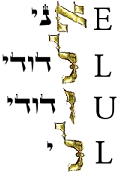
The King is Coming!
The King is coming, the King is coming! Have you heard the news? We must prepare for His soon arrival! For Christians and Messianic Jews, the month of Elul and the preparation for Rosh Hashanah reminds us to be ready for the soon appearance of Yeshua our LORD. Though we do not know the exact day or hour of His return to possess His kingdom on earth, we are commanded to watch and be ready for His soon appearance. We ought, therefore, be in a constant state of repentance as we seek to humble ourselves and walk with our LORD.
Hear the Shofar Blast
During this time it is customary to blow the shofar every day (except on Shabbat). The custom is to first blow tekiah (תְּקִיעָה), a long single blast (the sound of the King's coronation), followed by shevarim (שְׁבָרִים), three short, wail-like blasts (signifying repentance), followed by teruah (תְּרוּעָה), several short blasts of alarm (to awaken the soul), and to close with tekiah hagadol (תְּקִיעָה הַגָּדוֹל), a long, final blast.
 |
The Way of Teshuvah - תשובה

09.08.08 The way of teshuvah (returning to the LORD) is a four step process. First we must stop doing the sin of which we are conscious (John 8:11; 1 John 3:4, 8-9; Ezek. 18:21, 32; 2 Chron. 7:14, etc.). Next we must regret what we have done (Psalm 51; 2 Cor. 7:10). Third, we must confess our sin to God with a broken heart (Psalm 32:5, Prov. 28:13; 1 John 1:7-9; James 5:16). And finally, we decide to turn away from the sin (Matt. 3:8; Luke 15:10; Acts 11:18; 20:21; Rom. 2:4; 1 Pet. 4:1). The road back to God first of all involves rigorous honesty and self-examination. Only when we understand that we are lost do we begin to search for the way of return.
The LORD has made the way of return (teshuvah) a matter of the heart and will. "For this commandment (of teshuvah) is not hidden from you, and it is not far away. It is not in heaven...nor across the sea.... Rather, the matter is very near you - in your mouth and your heart - to do it" (Deut. 30:11-14; cp. Rom. 10:8-13). For traditional Jews, teshuvah is a yearly process that culminates in the High Holidays of Rosh Hashana and Yom Kippur.
The New Testament links teshuvah with salvation (יְשׁוּעָה) itself. Yeshua's first message was "Repent and believe the gospel (בְּשׂוֹרָה)" (Mark 1:15), and Paul linked teshuvah with confession and trust in the saving work of the Messiah on our behalf (Rom. 10:8-13). Teshuvah implies a response to the Person of Yeshua that is demonstrated through confession that He is none other than YHVH, the LORD of Compassion and grace.
 |
Parashat Ki Tetzei - פרשת כי־תצא
09.07.08 The Torah reading for this coming Shabbat is Ki Teitzei ("When you go out"), the 49th portion (of 54) for the Hebrew year 5768.

No less than 74 of the Torah's 613 commandments are given in this Torah portion, covering a wide assortment of rules related to ethical warfare, family life, burial of the deceased, property laws, the humane treatment of animals, fair labor practices, and proper economic transactions.
Getting Ready for Rosh Hashanah

09.07.08 Rosh Hashanah (ראש השנה) begins September 29th this year. According to Jewish thinking, this holiday commemorates the creation of the universe by God. The Mishnah (earlier part of the Talmud) refers to Rosh Hashanah as the "Day of Judgment" (Yom ha-Din) since all of creation owes allegiance to the Creator and is accountable to Him. The Name Elohim (אֱלהִים) revealed in Genesis 1:1 bespeaks God as the Creator and Judge of the universe (the Name YHVH, on the other hand, reveals God's compassion, as the One who intimately relates to humanity and breathes into us the breath of life (Gen. 2:4)). In Jewish tradition, on Rosh Hashanah, we stand before God as our personal Creator and Judge....
A midrash says that every year that is poor in the beginning is wealthy in the end. As we approach the end of this calendar year, we should be conscious of having nothing of merit before our Creator and yet desiring fullness of life from Him... We should understand that God not only created the universe but also is continually creating it yesh me'ayin - out of nothing (Heb. 1:3). Since Rosh Hashanah is centered on creation, it is therefore centered on Yeshua Himself, of whom it is written: "all things were created by him, and for him" and in Him all things consist (συνεστηκεν) (Col. 1:16-17).

 |
Tzedek, Tzedek Tirdof...
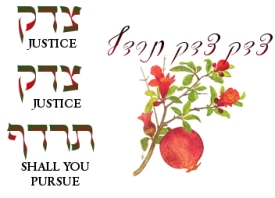
09.03.08 This week's parashah (Shoftim) includes the famous phrase "tzedek, tzedek tirdof" (צֶדֶק צֶדֶק תִּרְדּף): "Justice, Justice you shall purse" (Deut. 16:20). The word tzedek means "righteousness" and involves the duty to adhere to moral truth. The act of charity (called tzedakah) is therefore regarded an obligation rather than as gemilut chasadim (i.e., an act of benevolence). The prophet Isaiah wrote (Isa. 32:17): "The work of righteousness (tzedakah) shall be peace" (וְהָיָה מַעֲשֵׂה הַצְּדָקָה שָׁלוֹם), and added that "the service of righteousness shall be quietness and security forever (וַעֲבדַת הַצְּדָקָה הַשְׁקֵט וָבֶטַח עַד־עוֹלָם).
It is psychologically impossible for us not to judge, since the mind must make distinctions in order to function intelligibly. The Talmud states that when we judge mercifully and in accord with the truth, the Divine Presence joins us, but if we act corruptly, we "push" the Presence away and create a sense of exile. Yeshua told us to "whatever you wish that others would do to you, do also to them, for this is the Law and the Prophets" (Matt. 7:12). As we judge others, so we are judged ourselves. Looking at others from a selfish perspective is therefore a form of "bribery" that blinds us to the truth about righteousness (see Deut. 16:19).
Tzedek, tzedek tirdof also means that justice must be pursued in a just manner. The methods used to obtain justice must themselves be just. The Scriptures therefore do not advocate pragmatism or utilitarian thinking. There are no "noble lies" in the Kingdom of Heaven. Violence (verbal or physical) or deception done in the name of God is always a bad idea. We must execute great restraint and caution when we confront oppression in the world. If you want to change the world around you, begin with yourself....
Our Torah reading adds, "You must be wholehearted with the LORD your God" (תָּמִים תִּהְיֶה עִם יְהוָה אֱלהֶיךָ) (Deut. 18:13). Notice the little word "with" in this verse (עִם). This verse hearkens to Micah 6:8: "What does the LORD require of you but to do justice (mishpat), and to love kindness (chesed), and to walk humbly (hatznea lechet) with your God?" Having a humble heart walks with the LORD. The word translated "humbly" comes from the same root that gives us the word tzeniut (צְנִיעוּת), meaning modesty or humility. Humility begins with the awareness that 1) there is a God and 2) you are not Him.... It is the practice of "knowing before whom you stand" and living your life in light of this basic truth.
A.W. Tozer wrote: "The humble man will attain a place of soul rest. As he walks on in humility he will be happy to let God defend him. The old struggle to defend himself is over. He has found the peace which humilty brings." May it please the LORD to give us all hearts of genuine humility.
Know Before Whom You Stand
09.01.08 The Hebrew word kavanah (כַּוָנָּה) means "concentration" or "intention." In many synagogues there is a powerful phrase displayed on the doors of Aron Ha-Kodesh (the holy ark in which are kept the Torah scrolls) that says, "Know before whom you stand" (in Hebrew: דַּע לִפְנֵי מִי אַתָּה עוֹמֵד - da lifnei mi attah omed). This phrase is intended to remind us that we are to have a reverent and focused attitude while we are at services. Note, however, that such a distinction between the sacred and the profane is somewhat artificial, since we are always in the Presence of God (Acts 17:28) and the whole earth is filled with His glory (Isa. 6:3). But taken as a general principle of life, da lifnei mi attah omed enjoins us to be aware that everything we say, think, or do is before the divine audience of the Living God (אֵל־חָי) Himself.
Since the LORD is infinite, the distinctions we make (as finite creatures) in terms of time and space do not apply to Him. God infinitely transcends all of creation and He alone is holy (Isa. 42:8, 28:11). But understand that God's infinite Presence also means He "fills the heavens and the earth" (Isa. 6:3). The whole earth is lit up with God's Glory, and every bush is aflame before us, if we have eyes to see...
Though God is infinitely above us, He is not "remote" from us, nor are the very angels in heaven any "closer" to Him than you are right now. As the One who Emptied Himself said, "your Heavenly Father knows the number of hairs upon your head" (Matt. 10:30). We can draw close to Him by opening our eyes of faith.
Parashat Shoftim - פרשת שופטים
09.01.08 The Torah reading for this coming Shabbat is Shoftim ("Judges"), the 48th portion of the Hebrew year of 5768.

In this parashah we find the only passage in the entire Torah where Moses explicitly identifies himself as a prophet of the LORD. Moreover, this is also the only passage where Moses identifies the coming of the Mashiach as "a Prophet like me" (Deut 18:15; cp. John 6:14). See how the Lord Yeshua resembled Moses in no less than thirty (30) ways!
|






































